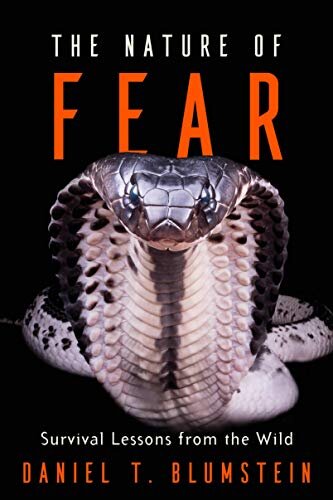The Nature of Fear by Daniel Blumstein
/The Nature of Fear: Survival Lessons from the World
By Daniel T. Blumstein
Harvard University Press, 2020
Much like the experience of marriage, the sensation of fear in humans is exhausting and largely excruciating but can have the odd positive side-effect and is probably in large part responsible for the survival of the species. Fear feels terrible because it’s built to feel that way; it traumatizes, but it can save us from barely-seen dangers or our own folly, and so it has survived evolutionary winnowing, not only in humans but in every animal species on Earth.
The wide spectrum of those fear-riddled species across the planet is refreshingly represented in The Nature of Fear, a slim new book by University of California professor Daniel Blumstein, who, readers are told, is also an elected fellow of the Animal Behavior Society, and in the course of the book’s relatively skimpy 200 pages, although he consults with experts on everything from dwarf fish to wallabies, he himself seems rather charmingly enamored of marmots, the fat ground squirrels who have, it turns out, a fairly complex relationship with fear.
The choice to broaden the inquiry of this popular account is a wise one; it gives readers the ability to see how fear manifests itself across a wide array of living creatures. As Blumstein and his other experts illuminate, fear has functioned not only as a motivator but also, maybe counter-intuitively, to act as an evolutionary whetstone on which the faculties of reason and logic have been honed over the generations. In fascinating ways, the book illustrates how fear has served to enhance the “risk assessment” and “error management” capacities of all kinds of species.
It’s all very intriguing reading that will certainly change the way readers think about an emotional complex they’ve perhaps always written off as purely negative. Some of those readers may be a bit depressed that even in this Year of Our Lord 2020 Blumstein has to spend any time at all dealing with what primatologist Frans de Waal has referred to as anthropodenial, the weirdly entrenched prejudice in research and scientific circles that a book like The Nature of Fear should only deal with humans. “I do not assert or believe that animals perceive or process things exactly the same way that we do. But is it really a stretch to assert that animals share emotion - fear- with us?” he asks. “I suggest not. While some may believe everything we see in humans is unique, there is much evidence that we share many traits with our ancestors.”
Yes indeed, the innumerable owners and companions of cats, dogs, mice, parrots, fish, and horses are solemnly assured, their animal friends do indeed experience fear even though, and let’s stress this, they’re not human. It’s almost enough to crush the inquiring spirit.
Matched with the dutiful understating is the occasional overstating, as when Blumstein extrapolates on political matters in the final chapter of his book (titled, perhaps inevitably, “Our Inner Marmot”):
Simple messages that tap into our fears can be so effective that they may result in wars! Consider the claims that Iraq under leader Saddam Hussein had weapons of mass destruction. If we could only eliminate them, the messaging indicated, we would be safe. We see how poorly that turned out.
Reducing the origins of George Bush’s War on Terror, or pretty much any aspect of it other than a packet of lies told to the public at odd intervals, to any permutation of fear is of course an impossible stretch. The US war on Saddam Hussein originated from a good three or four of the Seven Deadly Sins, but didn’t in any functional way originate from fear.
Nevertheless, The Nature of Fear’s main province is the fluttering pulse-rates of the broader animal kingdom, and that makes for mind-changing reading.
—Steve Donoghue is a founding editor of Open Letters Monthly. His book criticism has appeared in The Boston Globe, The Wall Street Journal, The Washington Post, and The American Conservative. He writes regularly for The National, The Vineyard Gazette, and The Christian Science Monitor. His website is http://www.stevedonoghue.com.
